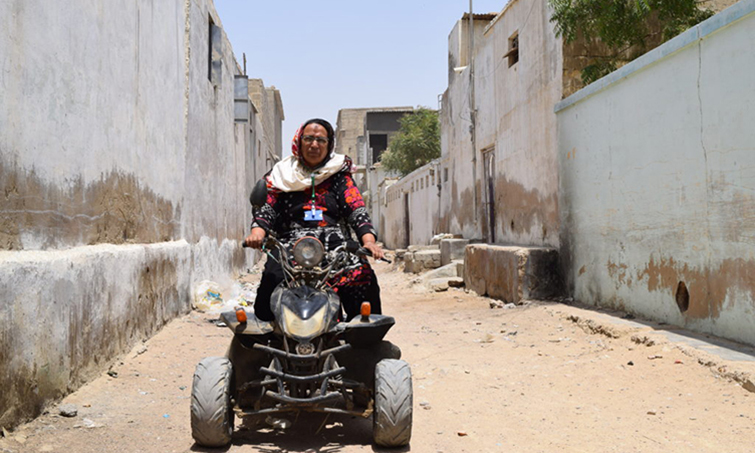Fifty-seven year-old Khalida, a striking figure on her four-wheeler motorbike, is a supervisor of one of the female vaccinators’ teams in Karachi, Pakistan’s largest city.
“I have been working as a supervisor for three years, but I have been associated with polio vaccination campaigns for many years as volunteer,” she explains. The community in the area where Khalida works is mostly from Pakistan’s tribal areas in the north-west of the country, and distrustful of outsiders. Traditionally, this mistrust involved not accepting vaccination. Today, all families in the area accept polio drops.

Khalida had worked in different jobs but wasn’t satisfied until she was offered a job of polio team supervisor. Her influence in the area has been critical to overcome myths about vaccination and build knowledge and trust.
Having women like Khalida working on the frontlines is a game changer for polio eradication. The fact that she is well known and trusted in her community means that mothers and fathers are more likely to allow her and her team to take the crucial step across the thresholds of their homes to vaccinate their children. The Pakistan Polio Programme’s emphasis on local, motivated, full-time, community-based female vaccinators has been improving immunization coverage figures. Across the country, the proportion of vaccinated children increased from 85% in August 2016 to 92% in May 2017, according to independent post-campaign monitoring.
In my community, the number of polio cases has decreased drastically. The progress is visible with the naked eye. We hold rigorous polio campaigns which are being carried out frequently in the area to reach every child multiple times with vaccines and keep them safe against paralysis. In this regard the contribution of the frontline health workers I supervise is remarkable, as they work hard to ensure each and every child is protected from this crippling disease.
Polio eradication is very important to have a healthy generation; as healthy generations, these children will be able to better serve the country – Khalida
For Khalida, vaccinating children against polio is a true mission. “Since I began working to end polio, I feel like I am a soldier. Just as an army fights to protect a country, similarly I fight against a virus which is disabling our beloved children. I will fight against this crippling disease until the virus is permanently eradicated and our beloved children are fully protected”.Khalida’s work spans a large area, with temperatures in the summer reaching 40°C, making the work of vaccinators very challenging. To provide supervision to the polio teams under her care, Khalida uses a motorbike specially designed for her for this very purpose – it has four wheels and is capable of crossing the rocky terrain and getting her where she needs to go at top speed. The sight of Khalida coming into a settlement on her motorbike has become a well-known, welcome sight.
Pakistan is one of only three last polio endemic countries, along with Afghanistan and Nigeria. The number of cases has declined dramatically in the past years: from 306 in 2014 to 20 in 2016. As of June 2017, the number of polio cases reported in Pakistan was three.
